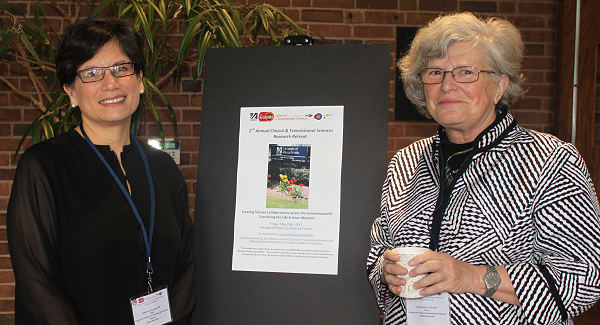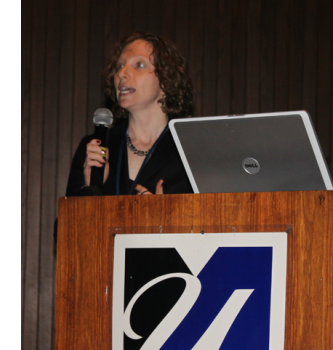 Katherine Luzuriaga, MD, left, and Catarina Kiefe, MD, PhD, co-chaired the planning committee of the second annual Clinical & Translational Science Research Retreat. |
A crowd of more than 200 energized and enthusiastic University of Massachusetts staff and faculty turned out for the second annual Clinical & Translational Science Research Retreat “Creating Science Collaborations across the Commonwealth: Translating the Life Science Moment” on May 20 at the Hoagland-Pincus Conference Center. Attendees heard about the latest strides being made in clinical and translation research by their colleagues at the commonwealth’s only comprehensive public research university.
In his opening remarks to the packed auditorium, Chancellor Michael F. Collins, UMass vice president for the health sciences, praised the collaborative nature of the five-campus systems. Chancellor Collins noted that it was the unique level of interaction among clinicians and faculty at all five campuses—Worcester, Amherst, Dartmouth, Lowell and Boston—that made UMass an exciting and successful research enterprise.
The annual clinical and translational research conference is part of the five-campus clinical and translational science movement across the University. In July 2010, UMass Medical School received a five-year, $20-million grant from the National Institutes of Health (NIH) to support the recently established University of Massachusetts Center for Clinical and Translational Science (UMCCTS), which serves as the home for clinical and translational science and research across all UMass campuses. With this award, UMass Medical School joined the national consortium of institutions charged by the NIH with accelerating the process of turning laboratory discoveries into health benefits for individuals and populations, and enhancing the training of a new generation of researchers. The second annual Clinical and Translational Science Research Retreat highlighted the ongoing work being done at UMass Medical School, clinical partner UMass Memorial Health Care and other participating institutions to fulfill the mission of the UMCCTS.

Andrea Foulkes, ScD, associate professor of biostatistics at the School of Public Health and Health Sciences at UMass Amherst, gave the keynote address on personalized medicine.
The daylong event featured a keynote presentation by Andrea Foulkes, ScD, associate professor of biostatistics at the School of Public Health and Health Sciences at UMass Amherst, on unlocking the potential of personalized medicine. Hailed as the next frontier in medicine, decoding of the human genome will eventually allow physicians to tailor medical treatments to a person’s unique genetic code, many believe. Dr. Foulkes explained how current translational research efforts in biostatistics are advancing our understanding of disease from large, population sample averages found on the macro level, to the more precise individual level. Yet, researchers “can only find what their tools are designed to uncover,” said Foulkes. More needs to be done before these large genetic studies on disease populations can be applied on a personalized level.
The afternoon was capped by a series of nine mini symposiums on topics ranging from community outreach projects being conducted by faculty across the system to a discussion about how new polymer and sensor arrays being developed at UMass are being employed to potentially solve clinical problems and how evidenced-based research can be used to maximize value, rather than cost savings, from our health care system.
The conference was sponsored by the Office of Research. Catarina Kiefe, MD, PhD, chair and professor of quantitative health sciences and professor of medicine, and Katherine Luzuriaga, MD, professor of pediatrics and medicine, associate provost of global health and chief of the division of pediatric immunology and infectious disease , co-chaired the planning committee.